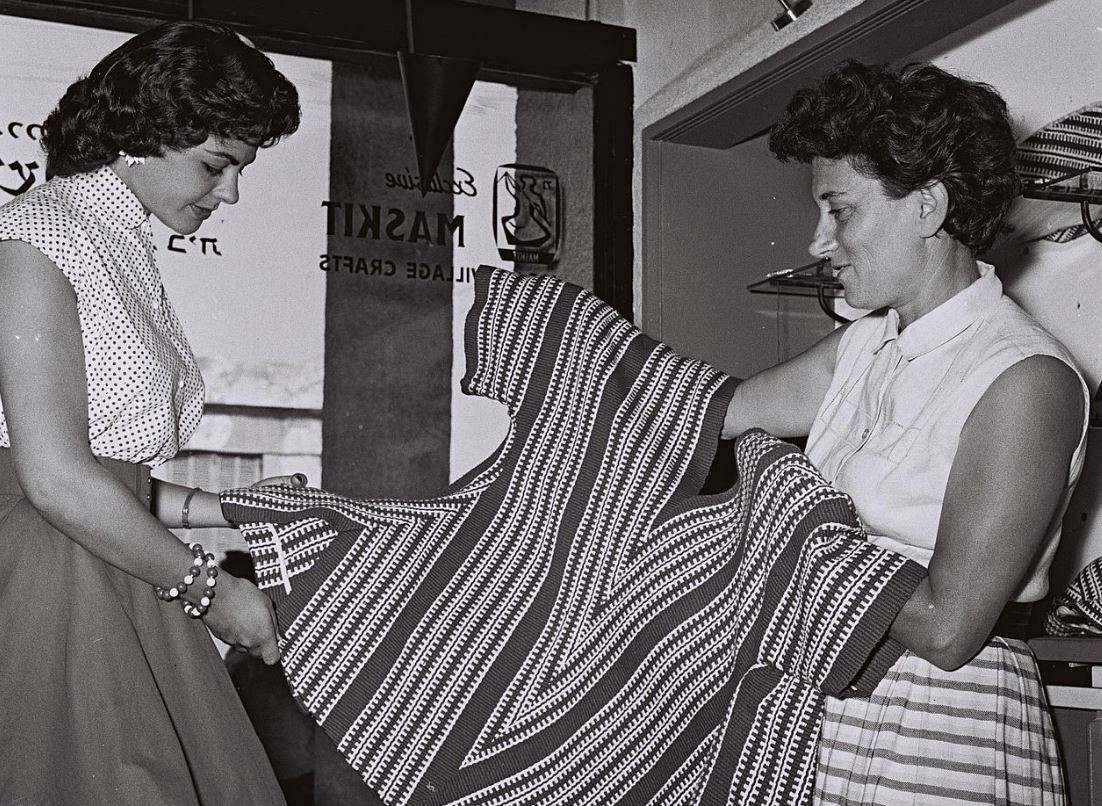One who purchases a animal or owns the animal through a partership with others, is exempt from animal tithes. The gemara discusses this exemption and brings exceptions to the rule.
This week’s learning is sponsored for the merit and safety of Haymanut (Emuna) Kasau, who was 9 years old when she disappeared from her home in Tzfat two years ago, on the 16th of Adar, 5784 (February 25, 2024), and whose whereabouts remain unknown.
This week’s learning is dedicated of the safety of our nation, the soldiers and citizens of Israel, and for the liberation of the Iranian people. May we soon see the realization of “ליהודים היתה אורה ושמחה וששון ויקר”.
This week’s learning is sponsored for the merit and safety of Haymanut (Emuna) Kasau, who was 9 years old when she disappeared from her home in Tzfat two years ago, on the 16th of Adar, 5784 (February 25, 2024), and whose whereabouts remain unknown.
Want to dedicate learning? Get started here:


Today’s daily daf tools:
This week’s learning is sponsored for the merit and safety of Haymanut (Emuna) Kasau, who was 9 years old when she disappeared from her home in Tzfat two years ago, on the 16th of Adar, 5784 (February 25, 2024), and whose whereabouts remain unknown.
This week’s learning is dedicated of the safety of our nation, the soldiers and citizens of Israel, and for the liberation of the Iranian people. May we soon see the realization of “ליהודים היתה אורה ושמחה וששון ויקר”.
This week’s learning is sponsored for the merit and safety of Haymanut (Emuna) Kasau, who was 9 years old when she disappeared from her home in Tzfat two years ago, on the 16th of Adar, 5784 (February 25, 2024), and whose whereabouts remain unknown.
Today’s daily daf tools:
Delve Deeper
Broaden your understanding of the topics on this daf with classes and podcasts from top women Talmud scholars.
New to Talmud?
Check out our resources designed to help you navigate a page of Talmud – and study at the pace, level and style that fits you.
The Hadran Women’s Tapestry
Meet the diverse women learning Gemara at Hadran and hear their stories.
Bekhorot 56
מָה בָּנֶיךָ — אֵין בְּלָקוּחַ וּבְמַתָּנָה, אַף צֹאנְךָ וּבְקָרְךָ — אֵינוֹ בְּלָקוּחַ וּבְמַתָּנָה.
Just as the redemption of your firstborn son does not apply to a child who was purchased or received as a gift, i.e., the mitzva applies only to one’s own son, so too, the mitzva of separating tithe from your flock and your herd does not apply to animals that were purchased or received as a gift.
וְהַאי בִּבְכוֹר כְּתִיב! אָמַר קְרָא: ״כֵּן תַּעֲשֶׂה״, אִם אֵינוֹ עִנְיָן לִבְכוֹר, דְּלָא אִיתֵיהּ בַּעֲשִׂיָּיה, דִּבְרֶחֶם קָדוֹשׁ — תְּנֵהוּ עִנְיָן לְמַעְשַׂר בְּהֵמָה.
The Gemara raises a difficulty: But this verse, which juxtaposes the firstborn son to an animal, is written with regard to redemption of a firstborn, not with regard to animal tithe. The Gemara explains that the verse states: “So you shall do with your oxen, and with your sheep: Seven days it shall be with its mother; on the eighth day you shall give it to Me” (Exodus 22:29). If this is not needed for the matter of firstborn animals, which do not require any action to sanctify them as the animal is already consecrated when it leaves the womb, apply it to the matter of animal tithe, where an animal is sanctified only when the owner counts it as the tenth animal.
וְאֵימָא: תְּנֵהוּ עִנְיָן לְחַטָּאת וּלְאָשָׁם! דּוּמְיָא דְּבִנְךָ — מָה בִּנְךָ שֶׁאֵינוֹ בָּא עַל חֵטְא, אַף צֹאנְךָ וְשׁוֹרְךָ שֶׁאֵינוֹ בָּא עַל חֵטְא.
The Gemara suggests: But instead one can say to apply this phrase: “So you shall do,” to the matter of a sin offering and a guilt offering rather than animal tithe, i.e., one should derive that these offerings are sanctified only if they originally belonged to the individual who is attempting to sanctify them, not if they are purchased or received as a gift. The Gemara explains that one expounds the phrase as referring to animal tithe because that case is similar to the case of: Your son. Just as your son does not come to be redeemed to atone for a sin, so too, the phrase: Your sheep and your oxen, discussed in the verse, is referring to animal tithe, which does not come to the Temple to atone for a sin. Sin offerings and guilt offerings are brought only if one commits a sin.
וְאֵימָא: תְּנֵהוּ עִנְיָן לְעוֹלָה וְלִשְׁלָמִים! דּוּמְיָא דְּבִנְךָ — מָה בִּנְךָ שֶׁאֵינוֹ בָּא בְּנֶדֶר וּנְדָבָה, אַף צֹאנְךָ וְשׁוֹרְךָ כּוּ׳.
The Gemara suggests: But instead one can say to apply this phrase to the matter of a burnt offering and a peace offering, which can be brought even if one has not sinned, like the animal tithe. The Gemara explains that one expounds the phrase as referring to animal tithe because that case is similar to the case of: Your son. Just as your son cannot come in the form of a vow or a gift, so too, the phrase: Your sheep and your oxen, discussed in the verse, is referring to animal tithe, which cannot be brought as a vow or as a gift. It is not referring to a burnt offering or a peace offering, both of which can be brought as a vow or as a gift.
וְאֵימָא: תְּנֵהוּ עִנְיָן לְעוֹלַת רְאִיָּיה! דּוּמְיָא דְּבִנְךָ — מָה בִּנְךָ שֶׁאֵין קָבוּעַ לוֹ זְמַן, אַף שׁוֹרְךָ וְצֹאנְךָ שֶׁאֵין קָבוּעַ לוֹ זְמַן.
The Gemara suggests: But one can say instead that one should apply this phrase to the matter of a burnt offering of appearance, which one brings when he ascends to Jerusalem on one of the three pilgrimage Festivals. This offering is not brought for a sin, nor as a vow or a gift, as it is obligatory. The Gemara explains that one expounds the phrase as referring to animal tithe because that case is similar to the case of: Your son. Just as your son does not have a fixed time of year to be redeemed, but is redeemed after the thirtieth day from his birth, so too: Your oxen and your sheep, discussed in the verse, is referring to animal tithe, which does not have a fixed time to be brought. By contrast, the burnt offering of appearance is brought only on the three pilgrimage Festivals.
אִי מָה בִּנְךָ אֵינוֹ בְּלָקוּחַ כְּלָל, אַף שׁוֹרְךָ וְצֹאנְךָ אֵינוֹ בְּלָקוּחַ כְּלָל, אַלְּמָה אָמַר רַבִּי אַסִּי אָמַר רַבִּי יוֹחָנָן: לָקַח עֲשָׂרָה עוּבָּרִין בִּמְעֵי אִמָּן — כּוּלָּם נִכְנָסִין לַדִּיר לְהִתְעַשֵּׂר?
The Gemara asks: If the halakha of the tithing of a purchased animal is derived from the juxtaposition to the mitzva of redemption of a firstborn son, then all the halakhot of one should apply to the other: Just as your firstborn son cannot be purchased at all, under any circumstances, so too, your oxen and your sheep should not be subject to animal tithe if they are purchased at all. If so, why does Rabbi Asi say that Rabbi Yoḥanan says: If one purchased ten animal fetuses while they were still in their mothers’ wombs and the animals were born once he already owned them, they all enter the pen to be tithed? If the halakha is derived from a firstborn son, there should be no concept of tithe in the case of purchased animals.
אָמַר רָבָא, אָמַר קְרָא: ״תַּעֲשֶׂה״ — בִּשְׁעַת עֲשִׂיָּיה מִיעֵט הַכָּתוּב.
Rava said in response that the verse states: “So you shall do with your oxen, and with your sheep: Seven days it shall be with its mother; on the eighth day you shall give it to Me.” The verse excludes purchased animals from animal tithe only at the time of doing, i.e., from the time the animals are fit to be sacrificed in the Temple, not while they are still in their mothers’ wombs, as at that time they are as yet unfit to be sacrificed on the altar.
גּוּפָא, אָמַר רַבִּי אַסִּי אָמַר רַבִּי יוֹחָנָן: לָקַח עֲשָׂרָה עוּבָּרִים בִּמְעֵי אִמָּן — כּוּלָּן נִכְנָסִין לַדִּיר לְהִתְעַשֵּׂר. וְהָא אֲנַן תְּנַן: הַלּוֹקֵחַ אוֹ שֶׁנִּיתַּן לוֹ בְּמַתָּנָה פָּטוּר מִן מַעְשַׂר בְּהֵמָה!
The Gemara discusses the matter itself, to cite the relevant discussion in full. Rabbi Asi says that Rabbi Yoḥanan says: If one purchased ten animal fetuses while they were still in their mothers’ wombs and the animals were born once he already owned them, they all enter the pen to be tithed. The Gemara asks: But didn’t we learn in the mishna: One who purchases an animal or has an animal that was given to him as a gift is exempt from animal tithe? If so, why isn’t the owner of these fetuses also exempt from animal tithe?
אָמַר רַבִּי אֶלְעָזָר: רַבִּי יוֹחָנָן חֲזַאי בְּחֶילְמָא, מִילְּתָא מְעַלְּיָא אָמֵינָא. אָמַר קְרָא ״תַּעֲשֶׂה״, בִּשְׁעַת עֲשִׂיָּיה מִיעֵט הַכָּתוּב. אֵיתִיבֵיהּ רַבִּי שִׁמְעוֹן בֶּן אֶלְיָקִים לְרַבִּי אֶלְעָזָר: הַלָּקוּחַ חָל עַל מְחוּסַּר זְמַן!
Rabbi Elazar said: I saw Rabbi Yoḥanan in a dream, which is a sign that I am saying a proper matter in explaining his opinion. The verse states: “So you shall do” (Exodus 22:29); the verse excludes purchased animals from animal tithe only at the time of doing, i.e., from the time the animals are fit to be sacrificed in the Temple. Rabbi Shimon ben Elyakim raised an objection to Rabbi Elazar from a baraita: The exemption of a purchased animal applies even to an animal whose time has not yet arrived, i.e., before it is eight days old and fit to be sacrificed in the Temple. By the same token, the exemption should also apply to a fetus, despite the fact that it is not yet fit to be sacrificed.
אֲמַר לֵיהּ: זוֹ אֵינָהּ מִשְׁנָה, וְאִם תִּמְצָא לוֹמַר מִשְׁנָה — רַבִּי שִׁמְעוֹן בֶּן יְהוּדָה הִיא מִשּׁוּם רַבִּי שִׁמְעוֹן, דְּאָמַר: מְחוּסַּר זְמַן נִכְנָס לַדִּיר לְהִתְעַשֵּׂר, וַהֲרֵי הוּא כִּבְכוֹר, מָה בְּכוֹר קָדוֹשׁ לִפְנֵי זְמַנּוֹ וְקָרֵב לְאַחַר זְמַנּוֹ — אַף מְחוּסַּר זְמַן קָדוֹשׁ לִפְנֵי זְמַנּוֹ וְקָרֵב לְאַחַר זְמַנּוֹ.
Rabbi Elazar said to Rabbi Shimon ben Elyakim: This baraita is not a tannaitic source that can be relied upon, as it is not accurate. And if you say this baraita is a tannaitic source that can be relied upon, it is only in accordance with the opinion of Rabbi Shimon ben Yehuda in the name of Rabbi Shimon, who says that an animal whose time has not yet arrived also enters the pen to be tithed, and in this regard it is like a firstborn animal. Just as a firstborn animal is sanctified before its time arrives to be sacrificed, but is sacrificed after its time, i.e., after it is at least eight days old, so too, an animal whose time has not yet arrived enters the pen to be tithed, and if it comes out as the tenth animal, it is sanctified before its time for sacrifice has arrived but is sacrificed only after its time, i.e., after it is at least eight days old.
תָּנֵי תַּנָּא קַמֵּיהּ דְּרַב: אֵיזֶהוּ אֶתְנַן שֶׁנִּכְנָס לַדִּיר לְהִתְעַשֵּׂר? כֹּל שֶׁנְּתָנוֹ לָהּ וְחָזַר וּלְקָחוֹ הֵימֶנָּה. וְהָא אִיפְּסִיל לֵיהּ בְּלוֹקֵחַ!
A tanna taught a baraita in the presence of Rav: Which is the type of animal set aside as payment to a prostitute, about which the Sages said (see 57a) that it enters the pen to be tithed? Any animal that he gave to her as payment and subsequently purchased back from her. The tanna asked: But doesn’t it become disqualified from the status of animal tithe as a purchased animal, as he purchased it back from the prostitute?
אִישְׁתְּמִיטְתֵּיהּ הָא דְּאָמַר רַבִּי אַסִּי אָמַר רַבִּי יוֹחָנָן: לָקַח עֲשָׂרָה עוּבָּרִין בִּמְעֵי אִמָּן — כּוּלָּם נִכְנָסִין לַדִּיר לְהִתְעַשֵּׂר.
The Gemara answers that this statement escaped that tanna: As Rabbi Asi says that Rabbi Yoḥanan says: If one purchased ten animal fetuses while they were still in their mothers’ wombs they all enter the pen to be tithed. Accordingly, the baraita can be understood as referring to an animal that was given to a prostitute as payment and purchased back from her while it was still inside its mother’s womb.
וְתִיעַשְּׂרֵהּ אִיהִי! בְּזוֹנָה גּוֹיָה.
The Gemara asks: But if that is the meaning of the baraita, why is it necessary to purchase the animal back from the prostitute for it to be subject to animal tithe? Let her tithe it herself, as it is not prohibited as payment to a prostitute, since it was in the womb when he gave it to her. The Gemara answers that the baraita is referring to a gentile prostitute, to whom the mitzva of tithing animals does not apply.
וְלוֹקְמַהּ בְּזוֹנָה יִשְׂרְאֵלִית, וְתִיעַשְּׂרֵהּ אִיהִי! קָא מַשְׁמַע לַן דְּזוֹנָה יִשְׂרְאֵלִית לָא הָוֵי אֶתְנַן.
The Gemara challenges: But let the baraita establish this case, of an animal set aside as payment to a prostitute that nevertheless enters the pen to be tithed, as a case involving a Jewish prostitute, and let it be referring to a case where she tithes it herself. The Gemara explains that this baraita teaches us that an animal given as payment to a Jewish prostitute does not have the halakhic status of payment to a prostitute, and is not prohibited for sacrifice.
כִּדְאַבָּיֵי, דְּאָמַר אַבָּיֵי: זוֹנָה גּוֹיָה — אֶתְנַנָּהּ אָסוּר, וְכֹהֵן הַבָּא עָלֶיהָ אֵינוֹ לוֹקֶה מִשּׁוּם ״לֹא יְחַלֵּל זַרְעוֹ״. זוֹנָה יִשְׂרְאֵלִית — אֶתְנַנָּהּ מוּתָּר, וְכֹהֵן הַבָּא עָלֶיהָ לוֹקֶה מִשּׁוּם ״לֹא יְחַלֵּל זַרְעוֹ״.
The Gemara adds that this is in accordance with the opinion of Abaye, as Abaye says: An animal given to a gentile prostitute is considered to be payment to a prostitute, which is prohibited for sacrifice on the altar. And a priest who engages in intercourse with a gentile prostitute is not flogged due to the prohibition of: “A widow, or one divorced, or a profaned woman, or a prostitute, these shall he not take, but a virgin of his own people shall he take to wife. And he shall not profane his seed among his people, for I am the Lord who sanctifies him” (Leviticus 21:14–15). Conversely, an animal given to a Jewish prostitute is not considered payment to a prostitute and it is permitted to sacrifice it. But a priest who engages in intercourse with a Jewish prostitute is flogged due to the prohibition of: “And he shall not profane his seed among his people, for I am the Lord who sanctifies him.”
זוֹנָה גּוֹיָה אֶתְנַנָּהּ אָסוּר — גָּמַר ״תּוֹעֵבָה״ ״תּוֹעֵבָה״ מֵעֲרָיוֹת.
The Gemara clarifies Abaye’s opinion. An animal given to a gentile prostitute is considered payment to a prostitute, which is prohibited for sacrifice on the altar, as Abaye derives a verbal analogy from the word “abomination” stated with regard to payment to a prostitute: “You shall not bring the payment of a prostitute, or the price of a dog, into the House of the Lord your God for any vow, for both of these are an abomination to the Lord your God” (Deuteronomy 23:19), and the word “abomination” stated in the verses discussing those with whom relations are forbidden: “For whosoever shall do any of these abominations, the souls that do them shall be cut off from among their people” (Leviticus 18:29).
מָה עֲרָיוֹת, דְּלָא תָּפְסִי בְּהוּ קִדּוּשֵׁי — אַף זוֹנָה, בְּהָךְ דְּלָא תָּפְסִי בַּהּ קִדּוּשֵׁי.
The Gemara elaborates: Just as the verses discussing those with whom relations are forbidden are referring specifically to those women upon whom betrothal does not take effect, so too, the prostitute referred to in the verse is one upon whom betrothal does not take effect, i.e., a gentile prostitute.
וְכֹהֵן הַבָּא עָלֶיהָ אֵינוֹ לוֹקֶה מִשּׁוּם ״לֹא יְחַלֵּל זַרְעוֹ״, דְּלֹא יְחַלֵּל זַרְעוֹ אָמַר רַחֲמָנָא, וְהַאי לָאו זַרְעֵיהּ הוּא.
Abaye further stated: And a priest who engages in intercourse with her is not flogged due to the prohibition of: “And he shall not profane his seed among his people, for I am the Lord who sanctifies him.” The Gemara explains: The reason is that the Merciful One states that he should not profane his seed, i.e., his children, and any children born from this gentile prostitute are not considered to be his seed, as the children of a gentile mother are gentiles.
מַתְנִי׳ הָאַחִין וְהַשּׁוּתָּפִין, שֶׁחַיָּיבִין בַּקָּלְבּוֹן — פְּטוּרִין מִמַּעְשַׂר בְּהֵמָה, חַיָּיבִין בְּמַעְשַׂר בְּהֵמָה — פְּטוּרִין מִן הַקָּלְבּוֹן.
MISHNA: With regard to brothers and partners, i.e., brothers who are partners in the inheritance of their father, when they are obligated to add the premium [bakalbon] to their annual half-shekel payment to the Temple they are exempt from animal tithe. Conversely, those whose halakhic status is like that of sons who are supported by their father and are obligated to separate animal tithe are exempt from adding the premium.
קָנוּ מִתְּפִיסַת הַבַּיִת — חַיָּיבִין, וְאִם לָאו — פְּטוּרִין. חָלְקוּ, חָזְרוּ וְנִשְׁתַּתְּפוּ — חַיָּיבִין בַּקָּלְבּוֹן וּפְטוּרִין מִמַּעְשַׂר בְּהֵמָה.
The mishna clarifies: If the brothers acquired the animals through inheritance from the property in the possession of their father’s house they are obligated in animal tithe; but if not, they are exempt. How so? If they divided the inheritance between them and then reentered a partnership, they are obligated to add the premium and are exempt from animal tithe.
גְּמָ׳ תָּנוּ רַבָּנַן: ״יִהְיֶה לְךָ״ — וְלֹא שֶׁל שׁוּתָּפוּת. יָכוֹל אֲפִילּוּ קָנוּ בִּתְפִיסַת הַבַּיִת? תַּלְמוּד לוֹמַר: ״יִהְיֶה״.
GEMARA: The Sages taught in a baraita: The verse states: “That you shall set apart for the Lord all that opens the womb; every firstborn male that emerges from an animal that shall be yours belongs to the Lord” (Exodus 13:12). This teaches that the obligation of animal tithe applies only to an animal that belongs to you, i.e., to one owner, but not to an animal owned by partners. One might have thought that the obligation of the tithe does not apply to the animal even if brothers acquired the animals through inheritance from the property in the possession of their father’s house. Therefore, the verse states: “Shall be,” to include animals acquired through inheritance in the obligation of animal tithe.
וְהַאי בִּבְכוֹר כְּתִיב! אִם אֵינוֹ עִנְיָן לִבְכוֹר, דְּהָא אִיתֵיהּ בְּשׁוּתָּפוּת, דִּכְתִיב: ״וּבְכוֹרוֹת בְּקַרְכֶם וְצֹאנְכֶם״, תְּנֵהוּ עִנְיָן לְמַעְשַׂר בְּהֵמָה.
The Gemara asks: But this verse is not referring to animal tithe; rather, it is written with regard to firstborn animals. The Gemara answers: If it is not needed for the matter of firstborn animals, as the mitzva of sanctifying a firstborn animal does apply in a case of partnership, as it is written, in the plural form: “And you shall bring there your burnt offerings, and your offerings, and your tithes, and the offering of your hand, and your vows, and your gift offerings, and the firstborn of your herd and of your flock” (Deuteronomy 12:6), apply the verse to the matter of animal tithe, teaching that it does not apply to an animal owned by partners.
אָמַר רַבִּי יִרְמְיָה: פְּעָמִים שֶׁחַיָּיבִין בָּזֶה וּבָזֶה, וּפְעָמִים שֶׁפְּטוּרִין מִזֶּה וּמִזֶּה, פְּעָמִים שֶׁחַיָּיבִין בַּקָּלְבּוֹן וּפְטוּרִין מִמַּעְשַׂר בְּהֵמָה, וּפְעָמִים שֶׁחַיָּיבִין בְּמַעְשַׂר בְּהֵמָה וּפְטוּרִין מִן הַקָּלְבּוֹן.
§ The mishna teaches: If the brothers divided the inheritance between them and then reentered a partnership, they are obligated to add the premium and are exempt from animal tithe. Rabbi Yirmeya says: There are times when they are obligated both in this, the premium, and in that, animal tithe. And there are times when they are exempt both from this and from that. Furthermore, there are times when they are obligated to add the premium and are exempt from animal tithe; and finally, there are times when they are obligated in animal tithe and are exempt from having to add the premium.
חַיָּיבִין בָּזֶה וּבָזֶה — שֶׁחָלְקוּ בַּכְּסָפִים וְלֹא חָלְקוּ בַּבְּהֵמָה, פְּטוּרִין מִזֶּה וּמִזֶּה — שֶׁחָלְקוּ בַּבְּהֵמָה וְלֹא חָלְקוּ בַּכְּסָפִים.
The Gemara elaborates: The guiding principle is that partners are exempt from animal tithe but obligated to pay the premium, whereas in the case of individual ownership one is obligated in the animal tithe but exempt from paying the premium. Therefore, the case where they are obligated both in this, the premium, and in that, animal tithe, is when they divided the money they inherited from their father but did not divide the animals they inherited. The case where they are exempt both from this and from that is when they divided the animals but did not divide the money.
חַיָּיבִין בַּקָּלְבּוֹן וּפְטוּרִין מִמַּעְשַׂר בְּהֵמָה — שֶׁחָלְקוּ בָּזֶה וּבָזֶה.
The case where they are obligated to pay the premium and are exempt from animal tithe is when they divided up both this and that, the money and the animals, from the estate of their deceased father. Afterward they reestablished a partnership and are therefore partners in the normal sense, rather than co-owners of the original inherited estate, and partners are obligated to pay the premium and are exempt from the animal tithe.
חַיָּיבִין בְּמַעְשַׂר בְּהֵמָה וּפְטוּרִין מִן הַקָּלְבּוֹן — שֶׁלֹּא חָלְקוּ בְּזֶה וּבָזֶה.
Finally, the case where they are obligated in the animal tithe and are exempt from paying the premium involves brothers who have not divided this or that, the money and the animals of their father’s estate, between them at all. It is therefore considered as though their father is still the sole owner of the estate and is contributing the shekel for the pair of them. Since the estate is under individual ownership, the animal tithe must be separated from the livestock.
פְּשִׁיטָא! חָלְקוּ בַּבְּהֵמָה וְלֹא חָלְקוּ בַּכְּסָפִים אִיצְטְרִיכָא לֵיהּ, סָלְקָא דַּעְתָּךְ אָמֵינָא: כֵּיוָן דְּחָלְקוּ בַּבְּהֵמָה, גַּלּוֹ דַּעְתַּיְיהוּ דִּלְמִיפְלַג קָיְימִי, וְלִיחַיְּיבוּ בְּקָלְבּוֹן — קָא מַשְׁמַע לַן.
The Gemara asks: Isn’t it obvious? What is the novelty of Rabbi Yirmeya’s statement? The Gemara answers: It was necessary for Rabbi Yirmeya to teach the case where they divided the animals but did not divide the money. It might enter your mind to say that since they divided the animals they have thereby revealed their intent to divide the entire estate. Consequently, the estate stands to be divided, and they should be obligated to pay the premium. Therefore, Rabbi Yirmeya teaches us that they are exempt from paying the premium until they have actually divided the money.
אָמַר רַב עָנָן: לֹא שָׁנוּ אֶלָּא שֶׁחָלְקוּ גְּדָיִים כְּנֶגֶד תְּיָישִׁים וּתְיָישִׁים כְּנֶגֶד גְּדָיִים.
§ Rav Anan says: The Sages taught this halakha only in a case where they divided kids for goats and goats for kids, i.e., when the two brothers inherited both kids and goats, but one took all the goats and the other all the kids. Since each originally inherited both goats and kids, this division is tantamount to one brother trading his goats for the other’s kids. When they again become partners, they are considered like strangers who join together. Consequently, they are exempt from the animal tithe.
אֲבָל חָלְקוּ גְּדָיִים כְּנֶגֶד גְּדָיִים וּתְיָישִׁים כְּנֶגֶד תְּיָישִׁים — אוֹמֵר זֶה חֶלְקוֹ הַמַּגִּיעוֹ מִשָּׁעָה רִאשׁוֹנָה לְכָךְ.
But if they divided kids for kids and goats for goats, so that each takes some of both types, in the normal manner, one can say that this, i.e., the group of animals that each brother takes, is considered his share to which he is entitled from the outset, and no transaction between them has occurred. Consequently, when they reestablish the partnership the estate reverts to its original status as a single entity, and they are therefore obligated to separate animal tithe.
וְרַב נַחְמָן אָמַר: אֲפִילּוּ חָלְקוּ גְּדָיִים כְּנֶגֶד גְּדָיִים וּתְיָישִׁים כְּנֶגֶד תְּיָישִׁים — אֵין אוֹמְרִים זֶה הוּא חֶלְקוֹ הַמַּגִּיעוֹ מִשָּׁעָה רִאשׁוֹנָה לְכָךְ.
And Rav Naḥman says: Even if they divided the estate in the manner of kids for kids and goats for goats, we do not say that this, the group of animals taken by each brother, is considered his share to which he is entitled from the outset. Therefore, if they reestablish a partnership they are considered like partners and are exempt from separating animal tithe.
וְרַבִּי אֶלְעָזָר אָמַר: לֹא שָׁנוּ אֶלָּא שֶׁחָלְקוּ תִּשְׁעָה כְּנֶגֶד עֲשָׂרָה, וַעֲשָׂרָה כְּנֶגֶד תִּשְׁעָה.
The Gemara notes that this matter is also the subject of a dispute between other amora’im. And Rabbi Elazar says: The Sages taught this halakha only when they divided nine large goats for ten kids, and ten kids for nine large ones. Since the nine large goats are worth the same as ten kids, this division is tantamount to one brother trading his large goats for the other’s kids. When they again become partners they are considered as strangers who join together, and therefore they are exempt from the animal tithe.
אֲבָל חָלְקוּ תִּשְׁעָה כְּנֶגֶד תִּשְׁעָה וַעֲשָׂרָה כְּנֶגֶד עֲשָׂרָה — אוֹמֵר זֶה חֶלְקוֹ הַמַּגִּיעוֹ מִשָּׁעָה רִאשׁוֹנָה לְכָךְ.
But if they divided nine large goats for nine large goats and ten kids for ten kids, so that each takes some of both types, one can say that this, the group of animals taken by each brother, is considered his share to which he is entitled from the outset, and no transaction between them has occurred. Consequently, when they reestablish the partnership the estate reverts to its original status as a single entity, which means they are obligated to separate animal tithe.
וְרַבִּי יוֹחָנָן אָמַר: אֲפִילּוּ חָלְקוּ תִּשְׁעָה כְּנֶגֶד תִּשְׁעָה, וַעֲשָׂרָה כְּנֶגֶד עֲשָׂרָה, אֵין אוֹמֵר זֶה חֶלְקוֹ הַמַּגִּיעוֹ מִשָּׁעָה רִאשׁוֹנָה לְכָךְ.
And Rabbi Yoḥanan says: Even if they divided the estate in the manner of nine large goats for nine large goats and ten kids for ten kids, one does not say that this, the group of animals taken by each brother, is considered his share to which he is entitled from the outset. Therefore, if they reestablish a partnership they are considered as partners and are exempt from separating animal tithe.






































